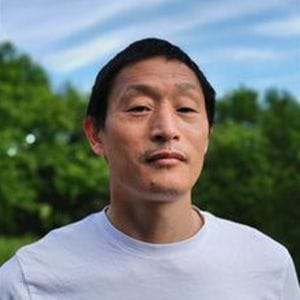In this interview, Prof. Shi discusses his recent research on air quality and shares his perspective on the global value of open access publishing.

As part of an ongoing series here on ACS Axial, we’re interviewing authors and librarians from around the world to find out more about their research, their published work, and the impact that open science is having on a changing landscape of research communication. This time, we talked to Professor Zongbo Shi, a Professor of Atmospheric Biogeochemistry at the University of Birmingham, United Kingdom.
I certainly feel that open access makes research more valuable, and more widely available, so that people all over the world can benefit from it.

Hello, Professor Shi. Could you tell us about your research group's current focus?
We have two primary areas. One is to better understand the chemistry of atmospheric processes, particularly involving aerosol particles—the tiny particles in air. The second area is applied research in air quality, both in terms of identifying sources of air pollution and how air quality can be improved overall through optimizing policies, such as net zero policies, so they can have the maximum benefit to human health and minimize the potential unintentional consequences for particularly vulnerable people.
In 2023, you published "Attribution of air quality benefits to clean winter heating polices in China using a machine learning and causal inference approach” in Environmental Science & Technology. Could you tell us about the work in that paper?
What we did in this project was collect observational air quality data from across China—both the south and north. Northern China has an annual, centralized heating policy that runs from November to March and is primarily provided through the burning of coal and biomass. The South is generally warmer and they don't have the same winter heating policy.
We used the South as kind of a control, and built a model so we could predict what might happen to air quality without clean heating. By comparing with real observed air quality, we can quantify the impact of winter heating. Over several years since the clean heating policies were implemented, we can see how much the pollution from heating has reduced because of cleaner sources of heat. It's not a policy specifically about air quality, but a side effect is the improvement in air quality—and the model allows us to quantify that using a causal inference methodology.
What was the publishing experience like in Environmental Science & Technology (ES&T)?
ES&T is an important journal for us. We've published quite a few papers there over the years, and I very much like the journal. The submission system can be a bit complex, but the editors are very good and the whole process from submission through to review and publication is overall quite pleasant.
Your article was published in 2023. What kind of impact do you think it's had?
While I think the public visibility could have been higher if we'd issued a press release, the academic impact has been obvious. It's been well cited and the methodology we introduced has become more valued within the field, with many academics starting to apply similar approaches.
Since 2017 there's been a massive research project in Beijing involving many research groups from the UK, including my own, to help measure and control air pollution in China. The air quality in China is improving as a result of all the policy recommendations from this project which is bringing health benefits to the population.
The article was published as open access (OA) under your institution's agreement with ACS—how did you discover this was available?
We've known about this for quite a few years, and our institution's library told us when this option became available. For some publishers, they send us an invoice and then the library takes care of it for us, and for the agreement with ACS we just need to opt in and it's all handled automatically. So it's perfect—it's really not much hassle for us at all.
What are your thoughts on the concept of open access?
Well, it can't be better. When I was doing my Ph.D. some years ago, we didn’t really have easy access to articles; we had to go to the national library and make copies from the physical journals. Over time, more journals became available online with a subscription, which makes them more accessible but there was still so much research you couldn't access.
The UK is in a really great position; even if the research you need isn't open access, your institution can usually get hold of it for you. But in a lot of other countries, it's just not possible because they don't have the same kind of funding. I certainly feel that open access makes research more valuable, and more widely available, so that people all over the world can benefit from it. It also helps people identify what's been tried before and maybe not worked as expected, so they don't waste time and resources on issues that have been tried or published already.
What are your thoughts on open science workflows more generally, such as transparent peer review and preprinting?
I've had some limited experiences with transparent peer review. Some journals are piloting that, and I personally feel it's a good idea—putting all the discussions between authors and reviewers online can be really useful.
I also think preprints are very useful. I read them often to keep up to date with new research in my area, and I think most of my research group's recent papers have been posted as preprints too. They seem like they're being widely adopted now.
What do you think are the biggest recent developments in open science and open access?
I do feel that things moving more and more towards open access for most journals. I think that's a really good outcome for the scientific community worldwide.
Where do you see OA in 10 years' time?
I can't really be sure, but I would hope that in 10 years' time we have pretty much everything open access. Presumably, when that trend becomes clearer, the publishing cost will come down as well—that can be a barrier for a lot of the developing countries I've worked with. I think we're in a really great position in the UK, where most research we publish can be made OA through funding from the government or UKRI. That's not the case in many other countries, and that's been a real problem for some researchers. If you need to budget £4,000 for a paper in particular journals, but the whole grant is £40,000 and you expect that the project will generate about five articles, you'll spend half your total research budget on publishing if you don't have other options. It means you can't do any research.
What do you think you'd be doing if you weren't a researcher?
I always wanted to save lives. The first choice would be a doctor but another line of work would be to improve people's lives because I think that's what makes my life meaningful. And in a sense, the air quality research I'm doing is in that general area.
